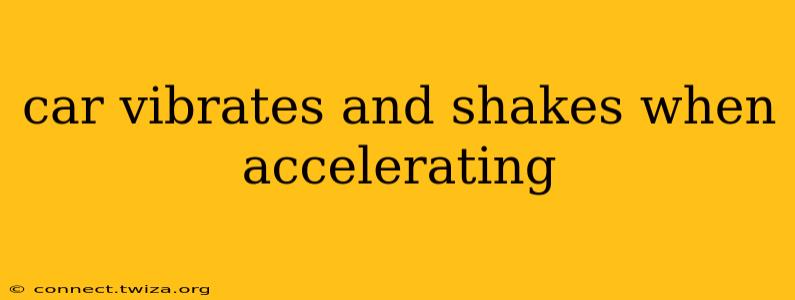Experiencing a vibrating and shaking sensation in your car while accelerating can be unsettling and potentially indicate a serious underlying issue. This comprehensive guide will help you diagnose the problem, understand its causes, and determine the necessary repairs. Ignoring these vibrations could lead to more significant damage and potentially dangerous driving conditions.
Why Does My Car Shake When I Accelerate?
This is a common question with many possible answers. The vibration and shaking often correlate with the engine's speed and the force of acceleration. The source could be anything from a simple imbalance to a more complex mechanical problem. Let's explore the most frequent causes.
Engine and Transmission Problems:
-
Engine Mounts: Worn-out engine mounts are a common culprit. These mounts isolate the engine from the chassis, and if they fail, engine vibrations transmit directly to the car's body, causing noticeable shaking, especially during acceleration. Replacing these relatively inexpensive parts is often a straightforward fix.
-
Transmission Issues: Problems within the transmission, such as worn-out components or low transmission fluid, can create vibrations that intensify during acceleration. A slipping transmission or a problem with the torque converter (in automatic transmissions) are potential sources. This requires professional diagnosis and repair.
-
Driveshaft Problems: A worn or damaged driveshaft, connecting the transmission to the wheels, can lead to vibrations that worsen with acceleration. This is particularly noticeable at higher speeds. Ignoring a damaged driveshaft can result in a serious breakdown.
-
Universal Joints (U-joints): These are crucial components within the driveshaft. Worn U-joints cause noticeable vibrations, often accompanied by clunking noises, especially during acceleration and cornering. Replacement is essential to restore smooth operation.
Wheel and Tire Issues:
-
Wheel Imbalance: This is a frequent cause of vibrations, especially at higher speeds. An imbalance means the weight distribution around the wheel isn't uniform, causing it to wobble, resulting in shaking felt throughout the car. Wheel balancing is a simple and inexpensive fix.
-
Tire Imbalance: Similar to wheel imbalance, imbalanced tires contribute to vibrations, particularly noticeable during acceleration. This can be due to uneven wear or damage to the tire. Tire rotation and potentially replacement may be necessary.
-
Bent or Damaged Wheels/Rims: A bent or damaged wheel can introduce vibrations that become more pronounced during acceleration. This often requires wheel repair or replacement.
-
Worn Tires: Uneven tire wear can create vibrations, especially during acceleration. Check your tires for uneven wear patterns. Rotation and/or replacement are possible solutions.
Other Potential Causes:
-
Brake System Problems: While less common, warped brake rotors can cause vibrations felt during acceleration, particularly when braking is also involved.
-
Suspension Problems: Worn suspension components, like struts, shocks, or bushings, can contribute to vibrations, especially over rough roads, and these can be exacerbated during acceleration.
-
Low Tire Pressure: While not directly a source of vibration during acceleration, significantly low tire pressure can make existing vibrations more pronounced and noticeable. Maintain proper tire pressure.
How to Diagnose the Problem
The best approach is to systematically eliminate potential causes. Here’s a suggested sequence:
-
Check tire pressure: Ensure all tires are inflated to the recommended pressure listed in your owner's manual.
-
Inspect tires and wheels visually: Look for any visible damage, uneven wear, or signs of imbalance.
-
Listen carefully: Note any accompanying noises, such as clunks, grinding, or whining sounds. These can provide clues about the source of the problem.
-
Test at different speeds: Determine if the vibration is speed-dependent. Does it happen only during acceleration, or is it present at cruising speed as well?
-
Consult a Mechanic: If you cannot identify the issue yourself, a qualified mechanic can diagnose the problem using specialized tools and expertise.
When Should I Take My Car to a Mechanic?
If the vibrations are severe, persistent, or accompanied by unusual noises, it's crucial to consult a mechanic immediately. Ignoring the problem could lead to more significant damage and potentially dangerous driving conditions.
Remember, this information is for guidance only and doesn't substitute professional advice. Always consult a qualified mechanic for diagnosis and repair.
